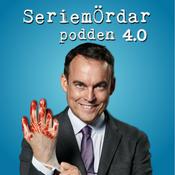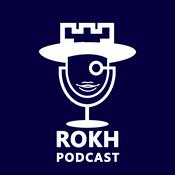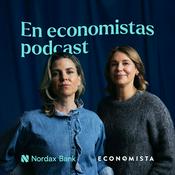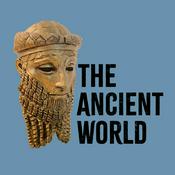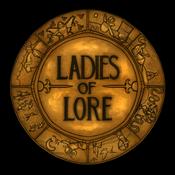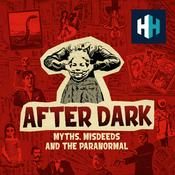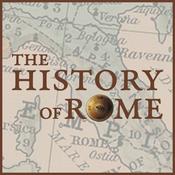292 avsnitt
- Melvyn Bragg and guests discuss the evolution of lungs and of the first breaths, which can be traced back 400 million years to when animal life spread from rock pools and swamps onto land, as some fish found an evolutionary advantage in getting their oxygen from air rather than water. Breathing with lungs may have started with fish filling their mouths with air and forcing it down into sacs in their chests, like the buccal pumping that frogs do now, and slowly their swimming muscles adapted to work their lungs like bellows.
While lungs developed in different ways, there are astonishing continuities: for example, the distinct breathing system that helps tiny birds fly thousands of miles now is also the one that once allowed some dinosaurs to become huge; our hiccups are vestiges of the flight reaction in fish needing more oxygen; and we still breathe through our skins, just not enough to meet our needs.
With:
Steve Brusatte
Professor of Palaeontology and Evolution at the University of Edinburgh
Emily Rayfield
Professor of Palaeobiology at the University of Bristol
And
Jonathan Codd
Professor of Integrative Zoology at the University of Manchester
Producer: Simon Tillotson
Reading list:
Roger B. J. Benson, Richard J. Butler, Matthew T. Carrano and Patrick M. O'Connor, ‘Air-filled postcranial bones in theropod dinosaurs: physiological implications and the ‘reptile’–bird transition’ (Biological Reviews: Cambridge Philosophical Society, July 2011)
Steve Brusatte, The Rise and Fall of the Dinosaurs: A New History of a Lost World (Mariner Books, 2018)
Jennifer A. Clack, Gaining Ground: The Origin and Evolution of Tetrapods (2nd edition, Indiana University Press, 2012)
Camila Cupello et al, ‘Lung Evolution in vertebrates and the water-to-land transition’ (eLife, July 2022)
Andrew Davies and Carl Moore, The Respiratory System (Elsevier, 2010)
Kenneth Kardong, Vertebrates: Comparative Anatomy, Function, Evolution (8th edition, McGraw-Hill Education, 2018)
Ye Li et al, ‘Origin and stepwise evolution of vertebrate lungs’ (Nature Ecology & Evolution, Feb 2025)
P. Martin Sander and Marcus Clauss, ‘Sauropod Gigantism’ (Science, Oct 2008)
Goran Nilsson, Respiratory Physiology of Vertebrates: Life With and Without Oxygen (Cambridge University Press, 2010)
Steven F. Perry et al, ‘What came first, the lung or the breath?’ (Comparative Biochemistry and Physiology, Part A: Molecular & Integrative Biology, May 2001)
Michael J. Stephen, Breath Taking: The Power, Fragility, and Future of Our Extraordinary Lungs (Grove/Atlantic, 2022)
Mathew J. Wedel, ‘The evolution of vertebral pneumaticity in sauropod dinosaurs’ (Journal of Vertebrate Paleontology, Aug 2010)
In Our Time is a BBC Studios Audio Production
Spanning history, religion, culture, science and philosophy, In Our Time from BBC Radio 4 is essential listening for the intellectually curious. In each episode, host Melvyn Bragg and expert guests explore the characters, events and discoveries that have shaped our world. - Melvyn Bragg and guests discuss the decisive role of one of the great 20th Century physicists in solving the question of nuclear fission. It is said that Meitner (1878-1968) made this breakthrough over Christmas 1938 while she was sitting on a log in Sweden during a snowy walk with her nephew Otto Frisch (1904-79). Both were Jewish-Austrian refugees who had only recently escaped from Nazi Germany. Others had already broken uranium into the smaller atom barium, but could not explain what they found; was the larger atom bursting, or the smaller atom being chipped off or was something else happening? They turned to Meitner. She, with Frisch, deduced the nucleus really was splitting like a drop of water into a dumbbell shape, with the electrical charges at each end forcing the divide, something previously thought impossible, and they named this ‘fission’. This was a crucial breakthrough for which Meitner was eventually widely recognised if not at first.
With
Jess Wade
A Royal Society University Research Fellow and Lecturer in Functional Materials at Imperial College, London
Frank Close
Professor Emeritus of Theoretical Physics and Fellow Emeritus at Exeter College, University of Oxford
And
Steven Bramwell
Director of the London Centre for Nanotechnology and Professor of Physics at University College London
Producer: Simon Tillotson
Reading list:
Frank Close, Destroyer of Worlds: The Deep History of the Nuclear Age, 1895-1965 (Allen Lane, 2025)
Ruth Lewin Sime, Lise Meitner: A Life in Physics (University of California Press, 1996)
Marissa Moss, The Woman Who Split the Atom: The Life of Lise Meitner (Abrams Books, 2022)
Patricia Rife, Lise Meitner and the Dawn of the Nuclear Age (Birkhauser Verlag, 1999)
In Our Time is a BBC Studios Audio Production - Since plants have to mate and produce offspring while rooted to the spot, they have to be pollinated – by wind, water, or animals – most commonly insects. They use a surprising array of tricks to attract pollinators: striking colours, iridescent light effects, and enticing scents, to name but a few.
Insects, on the other hand, do not seek to pollinate plants – they are looking for food; so plants make sure it’s worth their while. Insects are also remarkably sophisticated in their ability to find, recognise and find their way inside flowers.
So pollination has evolved as a complex dance between plants and pollinators that is essential for life on earth to continue.
With
Beverley Glover, Director of the Cambridge University Botanic Garden
Jane Memmott, Professor of Ecology at the University of Bristol
And
Lars Chittka, Professor of Sensory and Behavioural Ecology at Queen Mary, University of London.
Producer: Eliane Glaser
Reading list:
Stephen L Buchmann and Gary Paul Nabhan, The Forgotten Pollinators (Island Press, 1997)
Lars Chittka, The Mind of a Bee (Princeton University Press, 2023)
Steven Falk, Field Guide to the Bees of Britain and Ireland (British Wildlife Publishing, 2015)
Francis S. Gilbert (illustrated by Steven J. Falk), Hoverflies: Naturalists' Handbooks vol. 5 (Pelagic Publishing, 2015)
Dave Goulson, A Sting in the Tale: My Adventures with Bumblebees (Vintage, 2014)
Edwige Moyroud and Beverley J. Glover, ‘The evolution of diverse floral morphologies’ (Current Biology vol 11, 2017)
Jeff Ollerton, Birds and Flowers: An Intimate 50 Million Year Relationship (Pelagic Publishing, 2024)
Alan E. Stubbs and Steven J. Falk, British Hoverflies (British Entomological & Natural History Society, 2002)
Timothy Walker, Pollination: The Enduring Relationship Between Plant and Pollinator (Princeton University Press, 2020)
In Our Time is a BBC Studios Audio Production - Melvyn Bragg and guests discuss slime mould, a basic organism that grows on logs, cowpats and compost heaps. Scientists have found difficult to categorise slime mould: in 1868, the biologist Thomas Huxley asked: ‘Is this a plant, or is it an animal? Is it both or is it neither?’ and there is a great deal scientists still don’t know about it.
But despite not having a brain, slime mould can solve complex problems: it can find the most efficient way round a maze and has been used to map Tokyo’s rail network. Researchers are using it to help find treatments for cancer, Parkinson's and Alzheimer's disease, and computer scientists have designed an algorithm based on slime mould behaviour to learn about dark matter. It’s even been sent to the international space station to help study the effects of weightlessness.
With
Jonathan Chubb
Professor of Quantitative Cell Biology at University College, London
Elinor Thompson
Reader in microbiology and plant science at the University of Greenwich
And
Merlin Sheldrake
Biologist and writer
Producer: Eliane Glaser
In Our Time is a BBC Studios Audio production - Melvyn Bragg and guests discuss some of the great unanswered questions in science: how and where did life on Earth begin, what did it need to thrive and could it be found elsewhere? Charles Darwin speculated that we might look for the cradle of life here in 'some warm little pond'; more recently the focus moved to ocean depths, while new observations in outer space and in laboratories raise fresh questions about the potential for lifeforms to develop and thrive, or 'habitability' as it is termed. What was the chemistry needed for life to begin and is it different from the chemistry we have now? With that in mind, what signs of life should we be looking for in the universe to learn if we are alone?
With
Jayne Birkby
Associate Professor of Exoplanetary Sciences at the University of Oxford and Tutorial Fellow in Physics at Brasenose College
Saidul Islam
Assistant Professor of Chemistry at Kings College, London
And
Oliver Shorttle
Professor of Natural Philosophy at the University of Cambridge and Fellow of Clare College
Producer: Simon Tillotson
Reading list:
David Grinspoon, Venus Revealed: A New Look Below the Clouds of Our Mysterious Twin Planet (Basic Books, 1998)
Lisa Kaltenegger, Alien Earths: Planet Hunting in the Cosmos (Allen Lane, 2024)
Andrew H. Knoll, Life on a Young Planet: The First Three Billion Years of Evolution on Earth (Princeton University Press, 2004)
Charles H. Langmuir and Wallace Broecker, How to Build a Habitable Planet: The Story of Earth from the Big Bang to Humankind (Princeton University Press, 2012)
Joshua Winn, The Little Book of Exoplanets (Princeton University Press, 2023)
In Our Time is a BBC Studios Audio Production
Fler podcasts i Historia
Trendiga poddar i Historia
Om In Our Time: Science
Scientific principles, theory, and the role of key figures in the advancement of science.
Podcast-webbplatsLyssna på In Our Time: Science, The Rest Is Classified och många andra poddar från världens alla hörn med radio.se-appen
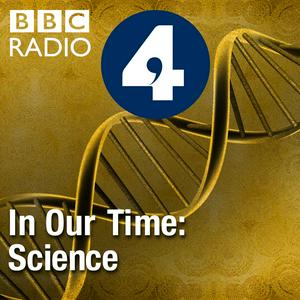
Hämta den kostnadsfria radio.se-appen
- Bokmärk stationer och podcasts
- Strömma via Wi-Fi eller Bluetooth
- Stödjer Carplay & Android Auto
- Många andra appfunktioner
Hämta den kostnadsfria radio.se-appen
- Bokmärk stationer och podcasts
- Strömma via Wi-Fi eller Bluetooth
- Stödjer Carplay & Android Auto
- Många andra appfunktioner


In Our Time: Science
Skanna koden,
ladda ner appen,
börja lyssna.
ladda ner appen,
börja lyssna.



